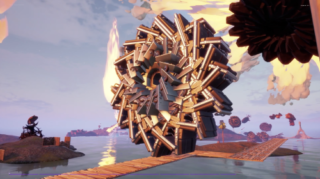
The Island 2021
HD video, 28’43’’
Commissioned for Rethinking Nature
Courtesy the artist and Kerlin Gallery, Dublin
In Sam Keogh’s The Island, his avatar – a whimsical ‘bushranger’ styled as a tree-being – leads the viewer through the technicolour cartoon dreamscapes of the massive online video game Fortnite. In the game, 100 players are parachuted onto a deserted island where they must scramble for resources and fight to the death, a task made more urgent by ‘The Storm’. The last one alive is the winner. The whole island sits in the eye of this storm which incrementally contracts, forcing players into confrontations with each other. Keogh’s narration draws connections between the game’s mechanics and the environmental impacts of its increasing membership. As islands and archipelagos around the globe, which still today evoke a colonial imaginary of pristine and uninhabited nature, are threatened by rising sea levels and ever more frequent extreme weather events, Fortnite’s popularity continues to rise. As a result, the game’s infrastructure grows, and ever greater numbers of dedicated banks of servers are stacked into the data centres which are now often built into artificial floating islands off the coastlines of northern Europe. While millions of online gamers on ‘The Island’ hit ‘play again’ to test their individualist survival skills in the face of climate collapse, ‘real life’ outside increasingly replicates its dynamics as eco-fascist, survivalist positions gain currency.
Artist’s statement
In The Island, I’m trying to draw connections between the premise of Fortnite and ecofascist fantasies of a fight to the death in the context of resource scarcity and climate collapse. An important text which helped me dissect these intersections of desire, fantasy and video games was Playstation Dreamworlds by Alfie Bown. Bown argues that videogames(as fantasy worlds we inhabit, interact with and manipulate) are closer to dreams than texts. And if this is the case, then the tools we need to understand and critique video games should be closer to Freudian dream analysis, rather than the more traditional tools of critique useful for film or literature. So the film attempts to take this idea and crack open the phenomenon of Fortnite from a more oblique angle, drawing parallels between the things we do in Fortnite as players and the kinds of fantasies of a future of violent and individualistic competition prevalent in ecofascist imaginaries.